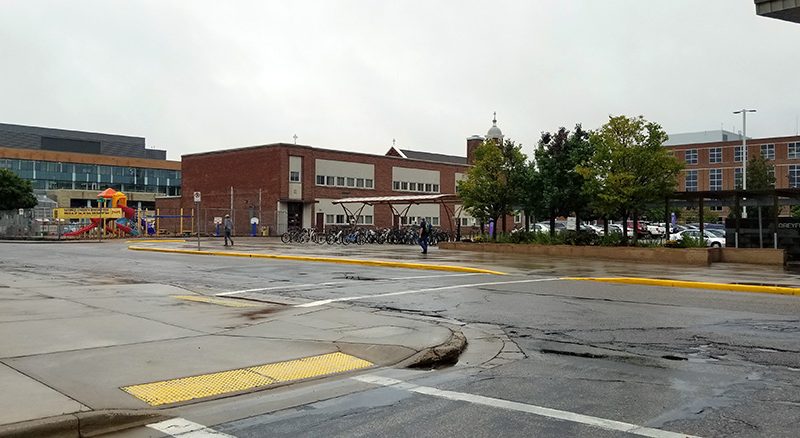Editorial: Story on Pride crosswalk about city process, not inclusivity
By Brandi Makuski
When the Metro Wire published its recent story about a new Pride crosswalk, our staff expected some negative comments on social media.
What wasn’t expected was how few people actually read the story. Many jumped to conclusions about what it contained, and some felt the need to toss unrelated and unnecessary personal attacks into the comment thread.
Any story about LGBTQ+ issues has a tendency to bring out the best and worst of intellectual arguments—and insults—from both sides.
But the story isn’t about LGBTQ+ issues.
The story we published would have been the same if the crosswalk were going to be painted red, white, and blue; or pink with unicorns jumping out of it. The story wasn’t about inclusivity, which was clear to anyone who actually read it. It had nothing to do with the specific colors being painted, or what they represented.
The story we published was about the process taken to approve changes at the crosswalk. And not dissimilar to the Stanley St. restripe, the Creative Crosswalk installation, and implementing a free WiFi service in the downtown, approving the crosswalk involved an incomplete public discussion, an unqualified degree of sovereignty, and a lack of transparency prior to approval.
With the exception of the Stanley St. project, all of the aforementioned items were approved, internally and without public discourse, by Mayor Mike Wiza.
Changing the Reserve St. crosswalk—a crosswalk being a transportation pavement marking strictly regulated by state and federal agencies to ensure safety and consistency—never came to the city council for approval. In fact, the issue has come up only twice in a public venue: once during a December 2018 meeting of the Bicycle and Pedestrian Street Safety Commission, where a vote was postponed pending additional information; and again during the September 2019 meeting of the city council, though on the latter occasion it was only referenced by a UWSP student addressing the council.
The police chief last year wrote a letter to the mayor outlining his concerns for safety in creating unnecessary distractions for motorists.
The public works director also had concerns, pointing out federal rules related to transportation marking uniformity, which state “nothing except an aesthetic treatment (earth-tone pavers, cobblestone, or similar elements) is allowed between the white transverse lines of a crosswalk.”
Still, the crosswalk changes were approved internally, which the city clerk said was all that was required.
Two aldermen have voiced concerns over the lack of a public process taken to arrive here. Councilman Mike Phillips, the longest-serving member of the council who recently announced he planned to resign soon, said he only just heard about the Pride crosswalk, and only from a fellow council member.
Alderman Jeremy Slowsinski, who has announced he will not seek re-election in April, became concerned after hearing about the crosswalk during the September city council meeting, saying the council never approved it.
Phillips, who chairs the city’s finance committee, said on Friday he had a hard time believing a project involving any city street was moving forward without approval from the committee, or the full city council, adding, “There can’t be any city money involved because the finance committee was never notified about that.”
There is city money involved in the project, though not much. But that’s hardly the point. Are we a city of laws and procedures, or can we—should we—consider projects on a case-by-case basis, depending on the flavor of elected officials, and every few years with a new group of college students eager to leave their mark on the world?
So you see, the story wasn’t about the colors of the crosswalk. It’s about something else entirely.
The issue of whether or not the city publicly supports and endorses inclusivity has been decided. In 2018, the city council passed a resolution condemning hate speech, and in July, the council approved officially recognizing June as Pride Month.
The public had many opportunities to speak on both topics. If the city’s elected representatives can agree on these issues, then perhaps they aren’t as divisive as some think they are.
While it’s been clear for some time that this city council has a stronger desire than past councils to support social justice causes, the public does have a voice. There are several opportunities for local residents to voice their support or concerns: with an open letter, a public statement during a city meeting, some form of direct legislation, or at the voting booth—or, if a significant number of people feel strongly enough, with a recall election.
Unfortunately, too many complain on Facebook without knowing enough of the details to make an informed argument. Too many skim a headline and assume they can piece together the story. Too few people make the effort to educate themselves. The lack of informed public discussion means that the wishes of local electeds will go unchallenged at every turn, subject to criticism only after the fact and in the form of the armchair quarterbacking of Facebook commenters.
Perhaps that’s the way some serving in local office prefer it. It’s easier to make things happen when you have fewer voices and facts clouding an issue. It certainly causes less controversy.
But it is that very controversy surrounding a project like this that demands a more transparent process. Our community deserves better than that.


